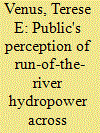| Srl | Item |
| 1 |
ID:
176758


|
|
|
|
|
| Summary/Abstract |
A large share of future European hydropower projects will be run-of-the-river schemes. To understand the potential for RoR hydropower development and modernization of the technology as an opportunity for sustainable decentralization, we use the Q-methodology to compare public values about RoR hydropower in German, Portuguese and Swedish case studies. Four perspectives on the importance of RoR hydropower emerged from our analysis: (i) maintain regional control, (ii) fight climate change, (iii) promote citizen well-being and (iv) protect natural ecosystems. Strong preferences for regional control imply RoR should be managed as distributed generation rather than viewed as part of a centralized, national system like traditional large-scale reservoir hydropower. Based on the importance of citizen well-being and ecological measures, operators could adopt strategies such as river widening and the reconstruction of secondary channels, which help control floods, create recreational opportunities as well as enhance ecological habilitation and biodiversity. Additionally, policymakers could support rigorous monitoring programs to assess the ecological impact of RoR.
|
|
|
|
|
|
|
|
|
|
|
|
|
|
|
|
| 2 |
ID:
150563


|
|
|
|
|
| Summary/Abstract |
Our article aims to understand the participation of the ‘backpacking neighbourhood’ Phạm Ngũ Lão in the current metropolization process of Hồ Chí Minh City. This neighbourhood is representative of Vietnamese ‘glocalization’. By this term, we mean the abilities of local stakeholders to benefit from the opportunities created by an increasingly global economy. These skills are reflected not only in innovations and landscape transformations to attract tourists, but also in ‘reactivations’ based on older urban practices. We question not only the production of specific urban territories through backpacking activities, but also the spatial and social inequalities they generate. By doing so, our intention is to combine tourism studies and urban studies to ‘unpack’ the figure of the backpacking neighbourhood and to go beyond the idea of urban enclaves.
|
|
|
|
|
|
|
|
|
|
|
|
|
|
|
|